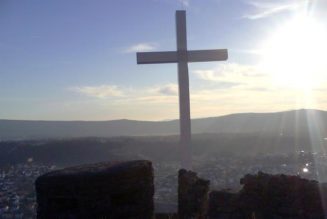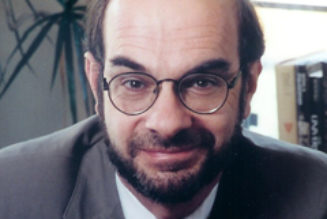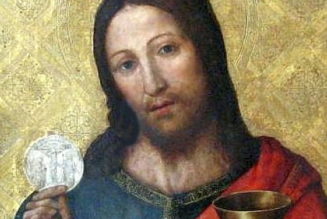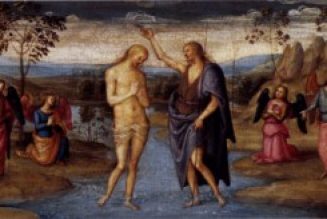I partially understand the predicament Nicodemus felt he was in when he snuck over to Jesus in the middle of the night in the Gospel we hear on the Fourth Sunday of Lent, Year B.
But I know the predicament I feel like I’m in. And I think the best way to describe it is this:
I am drowning in sewage, unable to pull myself up and out of the filth, when the one whose image I bear, the one who gave me everything I have, including my very life, plunges down into the muck beside me and pushes me up and out, into the fresh air and sunlight like a second birth — while he drowns in the sewage in my place.
But I’m getting ahead of myself.
To get the full effect of Jesus’s words in John’s Gospel this Sunday, imagine him saying them in a pitch-black night.
“Now there was a Pharisee named Nicodemus, a ruler of the Jews,” the third chapter of the Gospel begins. “He came to Jesus at night and said to him, ‘Rabbi, we know that you are a teacher who has come from God.”
Jesus rewards his baby step of faith by speaking the words that generations of Christians would memorize, repeat and lean on in hard times. First, he said we must be “born again” — born “from above” by “water and the Spirit.” Then he says the famous words of this Sunday’s Gospel:
“God so loved the world that he gave his only Son, so that everyone who believes in him might not perish, but might have eternal life. For God did not send his Son into the world to condemn the world, but that the world might be saved through him.”
Jesus goes on to explain to the man who was only willing to meet him in the nighttime: “the light came into the world, but people preferred darkness to light, because their works were evil.”
Nicodemus is us. We, too, are “rulers” of our worlds, asserting ourselves and grasping on to what we can control. We, too, are sincere seekers, but only when we can seek without exposing ourselves too much. But I’m getting ahead of myself again.
Let’s first consider the predicament Nicodemus himself was in.
Our First Reading, from Second Chronicles, gives a great accounting of how Jewish people understood their situation at the time of Christ.
They were the Chosen People, God’s own tribe. “Early and often did the LORD, the God of their fathers, send his messengers to them,” says the reading, “but they mocked the messengers of God, despised his warnings, and scoffed at his prophets.”
God walked with Adam and Noah, but they both chose sin. He rescued Moses and the Israelites out of slavery and lived among them in his tabernacle, but “the priests and the people added infidelity to infidelity,” the reading says, “polluting the Lord’s temple which he had consecrated in Jerusalem.”
What was the consequence? “Their enemies burnt the house of God, tore down the walls of Jerusalem, set all its palaces afire, and destroyed all its precious objects. Those who escaped the sword were carried captive to Babylon.”
Sunday’s Psalm shows what it was like for the Jews in exile: “By the streams of Babylon we sat and wept when we remembered Zion.”
Nicodemus is in a generation of Jews who saw the Temple again. But it was not the same.
As the First Reading continues, the pagan king Cyrus declares his intention to restore the Temple, and, in fact, a Second Temple was built. But while the First Temple was a massive place, intricate and ornate, with the Holy of Holies as its centerpiece, where God himself dwelt with his people — the Second Temple was smaller, less impressively appointed, and empty of the Presence of God, which had departed.
And while the First Temple was the pride of David’s own son, King Solomon, famed for his wisdom — the Second Temple carried the memory of King Solomon’s shameful end, and it was barely tolerated by the Roman procurator who governed Jerusalem in Caesar’s place and would soon destroy it.
So Nicodemus, who should have been basking in the glow of the greatness of Moses and David was instead a middle-manager in a compromised religion beholden to his enemies who would soon tear down the all-important center of his religion’s rituals.
Isn’t this the same predicament we are in?
We are in precisely his predicament, but we probably feel it in a more secular way. Like Nicodemus, we feel compromised. From our childhood, our stories and movies have told us to “believe in ourselves” and we would be great — whether that meant being plucked from obscurity like a Harry Potter or a Peter Parker, or embracing our own royalty like the Lion King or Rapunzel. As we became adults, we expected to be swept off our feet into a lifelong romances, and then to become acclaimed and accomplished like American Idols.
At the very least, we expected to march through life with confident success, even if our heroic secret identity had to stay hidden.
Instead, we find that life is not at all what we thought it would be. We aren’t masters of our fate; we are stuck in slavery to our appetites. We aren’t royal; we are helpless in front of a marketplace that toys with us, politics that unsettle us, and a work life that amounts to wage-slavery to our mortgages and debts.
Our spiritual life is an oasis for us, but one that is too often overwhelmed by darkness: Our prayer life is a shadow of what we wish it was; our Lenten fasting from sweets has been only partially successful, and is far from an epic self-sacrifice; and our almsgiving, the pittances we give after the bills are paid and our comforts are attended to, doesn’t feel like a heroic self-gift at all.
If we have any one master, it’s sin, which has flooded our culture with pornography, overwhelmed our economy with the bad debt and wild speculation of consumerism, and kept us helpless spectators in a world controlled by forces we don’t understand.
This is why I feel like I’m drowning in sewage.
If that analogy seems extreme, let me explain why I use it. In 2008, at the National Catholic Register, we covered the story of Tom Vander Woude, and I haven’t been able to stop returning to his story ever since. I adopted his practice of saying the Rosary with his family on his knees, doing a weekly Holy Hour at 2 a.m., and of sacrificing what I could for my sons and daughters.
It is only this year, after years of looking into the Extraordinary Story of Jesus’s life, that I realize what a beautiful analogy for Christ’s work of redemption God gave us in Mr. Vander Woude.
In 2008, Vander Woude was working on his rural Nokesville, Va., property when his then 20-year-old son Joseph, who has Down Syndrome, fell through the cover of a septic tank and began to drown.
Vander Woude jumped down into the tank and held his son’s head up to keep him alive until a neighbor arrived. Vander Woude pushed his son up while his neighbor pulled him out. Joseph was saved. Vander Woude himself succumbed to the fumes and drowned.
As if God planned it to show the parallels with his own Son, the incident occurred on the Feast of the Nativity of the Virgin Mary — when the vessel of our redemption arrived — and Vander Woude’s funeral was held on the Memorial of Our Lady of Sorrows, commemorating the time Our Lady held her own Son’s body after he gave his life for ours.
Vander Woude’s death is an icon for me of Christ’s redemption.
Jesus died to restore the hopes of Nicodemus and us after everything felt compromised and incomplete.
We get the death of Jesus Christ wrong if we think of the crucifixion like a peace offering to slake a petulant God’s thirst for blood.
Jesus died for us because “God so loved the world,” not because he was so fed up with it. And “God did not send his son into the world to condemn the world, but that the world might be saved.”
St. Anselm compared the redemptive act to Christ retrieving diamonds lost in the muck and cleaning them to reveal their true beauty. I prefer to think of Jesus saving me from my sin as being like Tom Vander Woude rescuing his son from the muck to reveal Joseph Vander Woude’s great value to the world.
But what Jesus did is far greater than what Vander Woude did. He didn’t just dive into the muck, but as Jesus says to Nicodemus in Sunday’s Gospel:
“Just as Moses lifted up the serpent in the desert, so must the Son of Man be lifted up.”
Jesus in the crucifixion becomes the twisted image of our very sin in order to save us. Or, as St. Paul put it:
“God, who is rich in mercy,
because of the great love he had for us,
even when we were dead in our transgressions,
brought us to life with Christ.”
In the communion line today, thank the risen Christ buoying you up above the filth you left behind, freeing you at last to breathe the fresh air of Trinitarian life.
Image: George Groutas, Nicodemus’ head by Michelangelo,
Museo dell’Opera del Duomo, Florence.

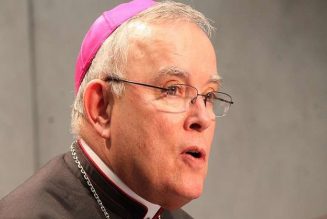


![Following UK Prime Minister Boris Johnson’s Catholic wedding, the task of announcing new Anglican bishops will fall to someone else [London Times paywall]…](https://salvationprosperity.net/wp-content/uploads/2021/06/following-uk-prime-minister-boris-johnsons-catholic-wedding-the-task-of-announcing-new-anglican-bishops-will-fall-to-someone-else-london-times-paywall-scaled-327x219.jpg)

